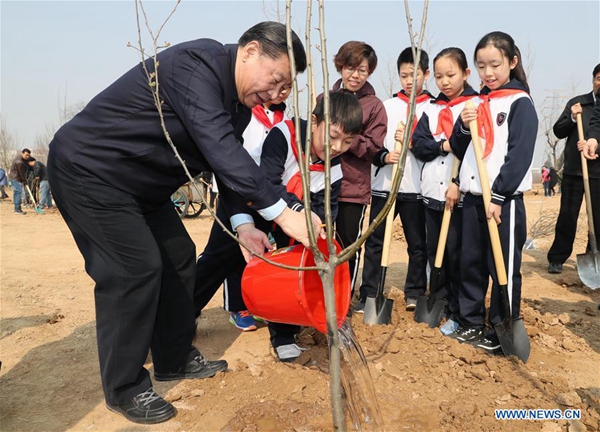War on graft a top priority
Prosecutors will keep up their pressure in the fight against corruption this year amid ongoing reform, a senior anti-graft official from the top procuratorate said.
Corruption in elections, environmental protection, food and drug safety and production safety will remain the primary targets, said Lu Xi, director of the General Bureau Against Corruption and Bribery of the Supreme People’s Procuratorate.
Job-related crimes by officials in financial sectors such as banking, securities and futures markets, as well as other graft issues that might hinder the development of reforms, also will get special attention from the graft-busters, Lu said in an exclusive interview.
Prosecutors also will monitor key poverty relief programs and funds to help safeguard a clean environment, she said.
“This is a very crucial year for combating corruption, and prosecutors nationwide will continue to take a zero-tolerance attitude toward corruption,” she said.
Lu said this year marks the last year before the next key Party congress, and the idea that “the anti-corruption campaign could end in the last year” must be wiped out.
China has carried out a sweeping anti-graft campaign since 2012, when the new leadership was elected at the 18th National Congress of the Communist Party of China. The 19th Party congress is scheduled in the second half of 2017.
Last year, prosecutors nationwide investigated 47,650 corrupt officials, including 21 at or above ministerial level, according to the annual work report by the top procuratorate released earlier this month.
Lu said anti-graft prosecutors also will adapt to the new requirements of the supervision system reform this year.
China is piloting a reform program to set up a new supervisory commission by integrating separate anti-corruption authorities. The program is being tested in Beijing and Shanxi and Zhejiang provinces, and if it functions well, such reforms will be expanded across the country.
Cao Jianming, procurator-general of the Supreme People’s Procuratorate, said earlier this month that the top procuratorate will guide its local branches in pilot areas to transfer relevant duties and personnel to supervisory commissions this year and establish a coordination mechanism between the two sides.
Another challenge that many prosecutors face now is the higher threshold for filing a corruption case, which keeps some cases from moving forward, Lu said.
The amended Criminal Law, which took effect in November 2015, lifted the criminal threshold for graft cases from 5,000 yuan (US$726) to 30,000 yuan (US$4,352).
The change also contributed to a decrease of corruption cases prosecutors handled last year nationwide, according to Hong Daode, a law professor from China University of Political Science and Law.
The annual work report of the top procuratorate shows that prosecutors last year handled 35,397 graft cases, down 13 percent from a year earlier.
“Under the new situation, prosecuting departments will strive to adapt to the new standards and take effective measures to maintain high pressure against graft,” Lu said
